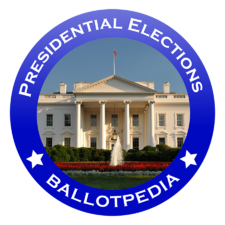Topics and participation in the CNN Republican debate (February 2016)
Ballotpedia's scope changes periodically, and this article type is no longer actively created or maintained. If you would like to help our coverage grow, consider donating to Ballotpedia.
Ballotpedia's scope changes periodically, and this article type is no longer actively created or maintained. If you would like to help our coverage grow, consider donating to Ballotpedia.
Date: November 8, 2016 |
Winner: Donald Trump (R) Hillary Clinton (D) • Jill Stein (G) • Gary Johnson (L) • Vice presidential candidates |
Important dates • Nominating process • Ballotpedia's 2016 Battleground Poll • Polls • Debates • Presidential election by state • Ratings and scorecards |
2028 • 2024 • 2020 • 2016 Have you subscribed yet?
Join the hundreds of thousands of readers trusting Ballotpedia to keep them up to date with the latest political news. Sign up for the Daily Brew.
|
This article analyzes the central themes of the tenth Republican presidential debate held on February 25, 2016, in Houston, Texas. The transcript prepared by The Washington Post was used to measure candidate participation and audience engagement.[1] Footage from the debate was consulted where there were ambiguities in the text.
To compare the statistics of this debate to those of the previous Republican debate, see the analysis of the CBS Republican debate held on February 13, 2016.
Segments
Including opening and closing statements, this debate featured 16 unique discussion segments covering immigration reform, healthcare and foreign policy. These discussion segments were measured by any shift in the theme of a discussion prompted by one of the moderators: Wolf Blitzer, María Celeste Arrarás, Hugh Hewitt and Dana Bash.
- Opening statements
- Amnesty and mass deportation
- U.S.-Mexico border
- Deferred Action for Childhood Arrivals
- Republican Party's appeal to Hispanic voters
- The Supreme Court vacancy and protection of religious liberty
- Repealing and replacing Obamacare
- Tax reform and the federal budget
- Disclosure of tax returns
- Israeli-Palestinian conflict
- North Korea
- Middle East
- Apple, privacy and counterterrorism
- U.S.-Canada border
- Puerto Rican debt crisis
- Closing statements
Overall participation
Participation in a discussion segment was defined as a substantive comment related to the discussion segment's topic. Jokes and attempts to gain permission from a moderator to speak were not considered participatory speech acts. In some instances, candidates who participated in a discussion segment diverted from the prompted topic.
The median number of discussion segments per candidate was 11. Donald Trump participated in the most discussion segments at 14. After receiving a question about the potential disclosure of his tax returns, Trump challenged the moderators to address the other candidates. He said, "Are you going to ask anybody else that question? Every single question comes to me? I know I'm here for the ratings, but it's a little bit ridiculous."[1]
Ben Carson only participated in eight discussion segments. He noted near the end of the debate to moderator Hugh Hewitt, "[P]eople say that I whine a lot because I don't get time. I'm going to whine because I didn't get asked about taxes, I didn't get asked about Israel. Hugh, you said you're going to be fair to everybody, you didn't ask me about taxes. I had something to say about that."[1]
Candidate participation by behavior
Participation in the debate was also measured by the candidate's behavior at the start of each discussion segment. This study considered whether a candidate was initially prompted by a moderator to speak during a discussion segment or whether he or she independently engaged in the discussion segment by interrupting another candidate or calling on the moderator for permission to speak. A candidate's conduct after they joined a discussion segment was not considered.
Although the candidates frequently talked over each other within each discussion segment, they generally waited until a moderator prompted them to speak before joining the discussion at first. Carson was the only candidate who attempted to join a discussion segment and failed.
Candidate participation by speaking order
This study also calculated the number of times a candidate spoke first, second or third during a discussion segment, whether prompted by a moderator with a question or invitation to rebut or by interjection.
The moderators called on Trump first or second in nearly all of the discussion segments. When moderator Wolf Blitzer said he would begin a discussion segment on the Israeli-Palestinian conflict with Trump, the candidate quipped, "Shocking."[1]
Candidate participation by speaking time
According to speaking time estimates from NPR, Trump spoke the longest, registering more than 30 minutes on the clock. He spoke for 20 minutes more than Carson.[2]
Candidate participation by speaking rate
Each candidate's speaking rate was calculated by dividing the total word count of the candidate's speech during the debate with his speaking time as measured by NPR. As in previous Republican debates, Rubio spoke significantly quicker than his peers at 249 words per minute.
Candidate participation by segment vs. speaking time
The amount of time a candidate spoke did not necessarily align with the number of issues he covered during the debate. However, in this debate, Trump dominated in both speaking time and the number of discussion segments he participated in.
Audience engagement
Audience engagement was measured by noting applause, cheering, or laughter in The Washington Post's transcript. Footage from the debate was consulted when the text was ambiguous about to whom the audience was responding.
With Jeb Bush's departure from the presidential race, Trump returned to the top of the field for the most positive audience engagement. He registered 46 instances, approximately double the number that Rubio and Cruz received.
The discussion segment on repealing and replacing Obamacare produced the most audience engagement overall.
Candidate analysis
|
|
|
|
|
See also
- Presidential candidates, 2016
- Presidential election, 2016/Polls
- 2016 presidential candidate ratings and scorecards
- Presidential election, 2016/Straw polls
Footnotes
| |||||||||||











